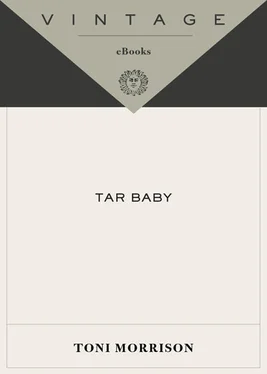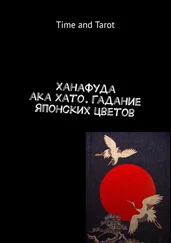Toni Morrison - Tar Baby
Здесь есть возможность читать онлайн «Toni Morrison - Tar Baby» весь текст электронной книги совершенно бесплатно (целиком полную версию без сокращений). В некоторых случаях можно слушать аудио, скачать через торрент в формате fb2 и присутствует краткое содержание. Жанр: Старинная литература, на русском языке. Описание произведения, (предисловие) а так же отзывы посетителей доступны на портале библиотеки ЛибКат.
- Название:Tar Baby
- Автор:
- Жанр:
- Год:неизвестен
- ISBN:нет данных
- Рейтинг книги:3 / 5. Голосов: 1
-
Избранное:Добавить в избранное
- Отзывы:
-
Ваша оценка:
- 60
- 1
- 2
- 3
- 4
- 5
Tar Baby: краткое содержание, описание и аннотация
Предлагаем к чтению аннотацию, описание, краткое содержание или предисловие (зависит от того, что написал сам автор книги «Tar Baby»). Если вы не нашли необходимую информацию о книге — напишите в комментариях, мы постараемся отыскать её.
Tar Baby — читать онлайн бесплатно полную книгу (весь текст) целиком
Ниже представлен текст книги, разбитый по страницам. Система сохранения места последней прочитанной страницы, позволяет с удобством читать онлайн бесплатно книгу «Tar Baby», без необходимости каждый раз заново искать на чём Вы остановились. Поставьте закладку, и сможете в любой момент перейти на страницу, на которой закончили чтение.
Интервал:
Закладка:

Contents
Title Page
Dedication
Epigraph
Foreword
He believed he was...
Chapter 1
Chapter 2
Chapter 3
Chapter 4
Chapter 5
Chapter 6
Chapter 7
Chapter 8
Chapter 9
Chapter 10
The man sat on the...
About the Author
Also by Toni Morrison
Acclaim for Toni Morrison’s
Copyright
FOR
Mrs. Caroline Smith
Mrs. Millie McTyeire
Mrs. Ardelia Willis
Mrs. Ramah Wofford
Mrs. Lois Brooks
—and each of their sisters,
all of whom knew
their true and ancient
properties
For it hath been declared
unto me of you, my brethren, by them
which are of the house of
Chloe, that there are
contentions among you.
I CORINTHIANS 1:11
FOREWORD
MY EAR is so close to the radio I have to be shouted away lest it ruin my hearing forever. Or I am cross-legged on the linoleum floor, breathing through my mouth, rapt, watching the giveaway eyes of the grown-up telling the story. All narrative begins for me as listening. When I read, I listen. When I write, I listen—for silence, inflection, rhythm, rest. Then comes the image, the picture of the thing that I have to invent: the headless bride in her wedding dress; the forest clearing. There is performance, too: “zzz went the saw,” accompanied by gesture. And cadence: “Old man Simon Gillicutty, caaatch me.” I need to use everything—sound, image, performance—to get at the full meaning of the story because I may be called upon to re-tell it for the pleasure of adults. Their judgment of my interpretation is critical.
Once upon a time there was this farmer. He planted himself a garden….
They are waiting. My mother is smiling in anticipation, but it is my grandmother I want most to please.
Yummy food, unique attention, playfulness, or loving sternness—these features are often summoned to sweeten one’s memory of a grandmother. Whether true or screened by time and loss, the relationship between grandmother and child usually surfaces as a warm and satisfying one. Mine, too, is sugared, but so much deeper than satisfaction that I don’t want to share it. Like the greedy child who can’t get close enough to the radio, I want it all to myself. She told us stories to keep us working at tedious tasks: picking through baskets of wild grapes to sort out the bruised; to take our minds off pain and chicken pox; to split open the dreary world to expose an enchanted one.
I was not my grandmother’s favorite. No matter, she was mine. I see her cutting lard into biscuit dough. I see my hands in hers as she dances with me. I smell the drops of turpentine in a teaspoon of sugar given to us in springtime. The school dresses she sewed, two each for my sister and me—plaid with a white collar; and once, she made us bobby suits. Most important, she was the one who wanted my dreams, mine alone, to interpret when she played the numbers. They were important to her, so I recalled them, shaped them into stories which, like hers, needed interpretation.
Once upon a time there was this farmer. He planted himself a garden….
Very funny, then scary, then funny again. Yet puzzling. At some level the tar baby story begged and offered understanding beyond “outlaw peasant outwits inventive master with wit and cunning.” It’s clear why the rabbit ate as much lettuce and cabbage as he could. It’s clear why the farmer had to stop him. But why a tar figure? And why (in the version I was told) is it dressed as a female? Did the farmer understand the rabbit so well he could count on its curiosity? But the rabbit isn’t curious at all; he passes by the tar baby, casually acknowledging its presence with “Good morning.” It is his being ignored and her being ill-mannered that annoy, then infuriate him. He threatens, then strikes her. Now he is stupid; if one of his paws sticks, why try another? The inventive farmer has succeeded but gets involved in a form of punishment, and having understood motivation so well earlier, now misunderstands completely. Now the stupid rabbit becomes the clever one, pretending that the punishment he fears most is being returned to his own neighborhood. He knows the farmer would reckon this return to the ’hood as supreme torture, worse than death, so into the briar patch he is unceremoniously, gleefully thrown. The figure of tar, having done its work, falls out of the action of the tale, yet remains not only as its strange, silent center, but also as the sticky mediator between master and peasant, plantation owner and slave. Constructed by the farmer to foil and entrap, it moves beyond trickery to art. The principal relationship is not limited to the rabbit and the farmer; it is also between the rabbit and the tar figure. She snares him; he knows it, yet compounds his entanglement while demanding to be freed. A love story, then. Difficult, unresponsive, but seducing woman and clever, anarchic male, each with definitions of independence and domesticity, of safety and danger that clash. The novel signals this conflict at the beginning: “He believed he was safe.” “Believed” rather than thought in order to stamp doubt, suggest unease.
It was the image of tar, however, artfully shaped, black, disturbing, threatening yet inviting, that led me to African masks: ancient, alive, and breathing, their features exaggerated, their power mysterious. A blatant sculpture sitting at the heart of the folktale became the bones of the narrative. All of the characters are themselves masks. And like African masks, the novel merged the primal and the contemporary, lore and reality. It was a blend that proved heady, even dizzying, but I believed the plotline solid and familiar enough to withhold or contain a reader’s sense of vertigo. If so, the original tale would have earned a new life. Which brings me back to the linoleum floor, listening to the women singing and telling their way through a buried history to stinging truth, enchanting the world where I was “born and bred at.”
They said she was dying. Something like “albumen” in the blood, a visiting doctor said. She mustn’t eat the whites of eggs. That was the diagnosis and the prescription. It was a brew of hit-and-miss medical attention, faith in God’s will, and a conviction that illness was mostly caused by food. (One of her daughters died at eighteen either of sitting on wet grass and catching “cold in the womb” or of the blackberry cobbler she ate the night before. In any case, my grandmother woke to find her sweet baby girl sleeping beside her as cold as frost.) Whatever the cause, my grandmother became very ill. Everyone available watched over her, and at some point I was sent into the bedroom to read to her. Something from the Bible, they said, to comfort her. I read solemnly, not understanding a word. I wanted to tell her a story instead—to amuse, maybe even cure her. Or recount a dream I’d had. But that would be frivolous, indeed, compared to the Bible. Silently she thrashed, turning restlessly under the sheet. I thought she wanted to run, to get away from this stupid grandchild who was awed by her assignment and inadequate to the task. Or perhaps she just wanted to go, to leave life, get quit of it. Minus income, she and her husband were living by turns with one offspring, then another. Although each of her daughters was pleased to have her and cared for her with fierce devotion, she was, in fact, like her husband, homeless. This sequence of beds—none their own—must have been unsettling if not humiliating. At the time I thought it a lovely life—traveling between towns, neighborhoods, “visiting” members of one’s family. But watching her walk her bedsheets, whip her head to and fro on the pillow…I don’t know. Of course, she was ill. Albumen and all…. But surely she could not die or want to. A few days later, when they told me she was dead, I thought, now no one will ask for my dreams. No one will insist I tell her a story.
Читать дальшеИнтервал:
Закладка:
Похожие книги на «Tar Baby»
Представляем Вашему вниманию похожие книги на «Tar Baby» списком для выбора. Мы отобрали схожую по названию и смыслу литературу в надежде предоставить читателям больше вариантов отыскать новые, интересные, ещё непрочитанные произведения.
Обсуждение, отзывы о книге «Tar Baby» и просто собственные мнения читателей. Оставьте ваши комментарии, напишите, что Вы думаете о произведении, его смысле или главных героях. Укажите что конкретно понравилось, а что нет, и почему Вы так считаете.











